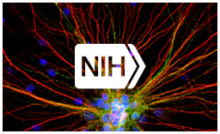
NIH announces two newly-issued Requests for Applications (RFAs). The first RFA seeks to expand existing marmoset colonies for neuroscience research. The second RFA aims to create a Marmoset Coordination Center. Application receipt dates are in October 2019 for both RFAs.
The common marmoset (Callithrix jacchus) has recently emerged as a promising model system to understand the primate brain. In particular, marmoset behavior is similar in many ways to human behavior and the technology for developing transgenic model systems is now possible. However, existing colonies and commercial sources are currently unable to provide enough marmosets for neuroscience research. Further, a recent National Academies workshop noted this current shortage of marmoset resources and suggested the expanded production of, access to, and coordination of marmosets. To address this demand for marmosets in neuroscience research, NIH announces two requests for applications (RFAs) for the BRAIN Initiative.
RFA-MH-20-145 [Marmoset Colonies for Neuroscience Research (U24 Clinical Trials Not Allowed)]
Current marmoset resources in the United States are relatively small, limiting the genetic diversity of the population within the country as a whole. Beyond currently available sources of marmosets, NIH estimates that the neuroscience research community currently needs access to an additional 100-400 marmosets each year. This notice of funding opportunity (NOFO) solicits applications to expand existing colonies to provide healthy, well-cared for, and well-documented common marmosets for neuroscience research in the United States. NIH plans to issue one or more awards to institutions with existing colonies. Applicants will be expected to describe their existing marmoset colony and their plans to expand existing infrastructure to accommodate the expanded population of the colony.
Awardees also are expected to participate in and provide health and genetic information to an NIH-Funded Marmoset Coordination Center (see below) to help the community understand the pedigree of individuals in the relatively small captive marmoset population and improve the genetic diversity of that population across multiple colonies. Additionally, while the focus of this NOFO is on the distribution of wild-type animals, many in the neuroscience research community are interested in creating and distributing genetically modified marmosets. As applicants plan to expand the access to wild-type marmosets, they should also be considering how that infrastructure might eventually be used to distribute genetically modified marmosets.
Applications for this RFA are due October 3, 2019.
RFA-MH-20-150 [Marmoset Coordination Center (U24 Clinical Trials Not Allowed)]
This NOFO solicits applications to create a Marmoset Coordination Center that will support and improve the use of marmosets in neuroscience research. The awardee will be responsible for two separate but related activities.
The first major duty is to coordinate information sharing across marmoset colonies. This coordination may be achieved by developing a digital repository for genomic, pedigree, and event records (date of birth, medical, reproductive history) for captive marmosets. The facility is expected to use the deposited information to assist colonies that have marmosets to improve the health and genetic diversity of the entire US marmoset population. The focus for the effort will begin with marmoset colonies that are in the United States. However, there are significant marmoset colonies in other countries, and so applicants are encouraged (but not required) to extend coordination activities to those colonies. Including foreign marmoset colonies may enable increasing the genetic diversity among the existing colonies in the United States.
The second major duty is to provide information and support to neuroscience researchers who are interested in using marmosets in their research programs. This includes offering advice about the advantages and disadvantages to incorporating marmosets in the research efforts in a laboratory and to support linking neuroscience researchers with colonies that may be able to supply marmosets for a particular research project. The coordination center will act as the centralized resource to manage requests for marmosets from the entire nation’s neuroscience research community.
Applications for this RFA are due October 18, 2019.
Please visit our Funding Opportunities page for more details on these and other RFAs for the BRAIN Initiative.
